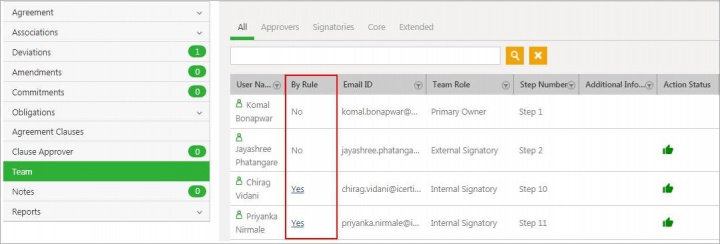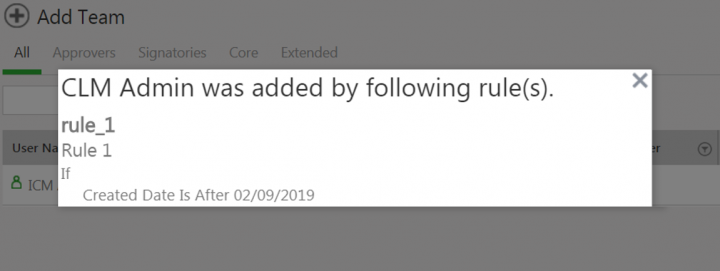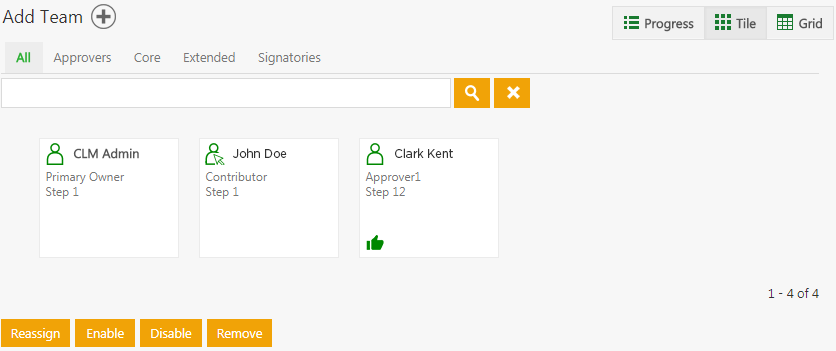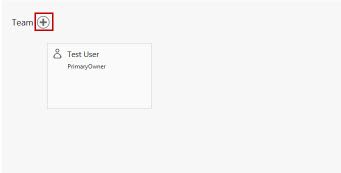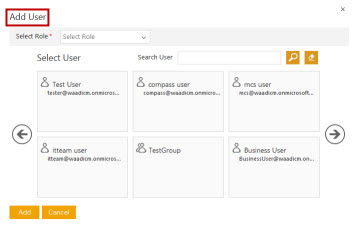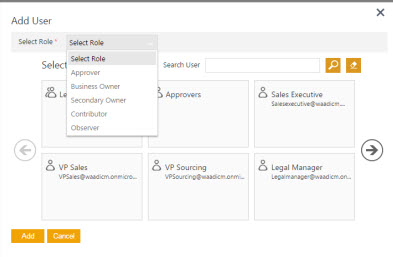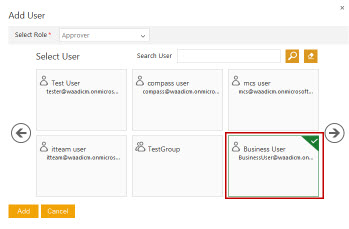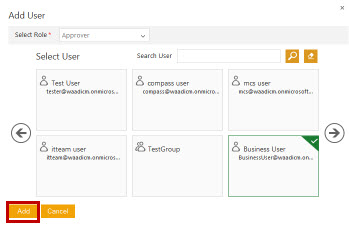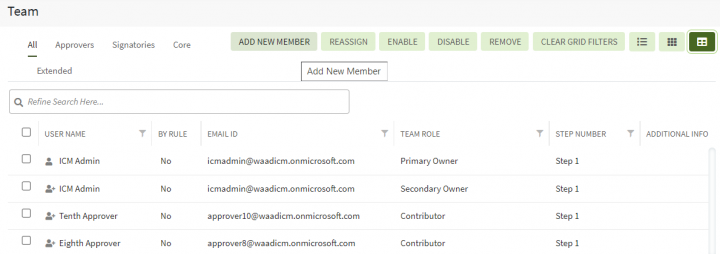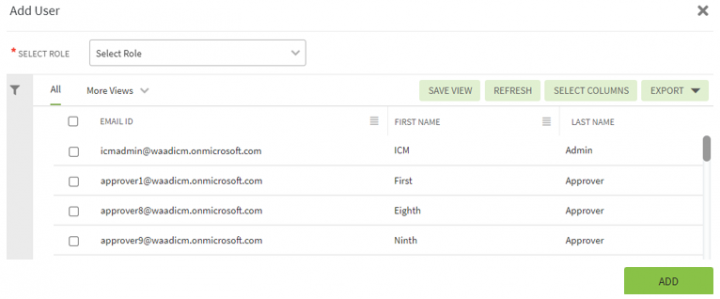| Line 1: | Line 1: | ||
| | ||
| − | |||
= Team = | = Team = | ||
| − | The | + | The Team tab displays the users with their roles assigned to the team of a specific Agreement. ICI allows you to take workflow actions on approvers from the ''Progress'' view of the''Team'' tab itself so that you don’t need to navigate to the grid and list view to take these actions: |
| − | *Search any user by either using the | + | *Search any user by either using the "Grid"'', "''Tile"''or "Progress" view'''''.''''' |
| − | *Add any user to the | + | *Add any user to the "Team"''from either of the views. |
*Remove any user from the Team. | *Remove any user from the Team. | ||
*Reassign a user. | *Reassign a user. | ||
*Enable/ Disable approvers. | *Enable/ Disable approvers. | ||
| − | *View the graphical representation of the Agreement lifecycle | + | *View the graphical representation of the Agreement lifecycle through the "Progress" view. It displays the different states that the Agreement has been through and the actions taken on it by various team members. |
*View the Notes added by individual approvers by a mouse-hover on the individual Approver in Progress view to see the Notes added by him/her during approval or rejection. Hence, you get all the relevant details in one place, without navigating to multiple tabs to get this information. | *View the Notes added by individual approvers by a mouse-hover on the individual Approver in Progress view to see the Notes added by him/her during approval or rejection. Hence, you get all the relevant details in one place, without navigating to multiple tabs to get this information. | ||
*View if a user is defined by a rule or not, in the ''By Rule'' column. The column displays ''Yes'' with a hyperlink if the user is defined by a rule. Clicking the hyperlink opens a window with the team member’s name and all the rule details. Any team members added via Event Rule will have “By rule” column as “No”. | *View if a user is defined by a rule or not, in the ''By Rule'' column. The column displays ''Yes'' with a hyperlink if the user is defined by a rule. Clicking the hyperlink opens a window with the team member’s name and all the rule details. Any team members added via Event Rule will have “By rule” column as “No”. | ||
| Line 22: | Line 21: | ||
'''Grid View:''' | '''Grid View:''' | ||
| − | + | Grid view dramatically reduces the time required to go through the complete list of team members to find a specific one. Through this view, you can easily refine your search for any specific team member. The search results are displayed in a tabular form. You can further sort your results by using ''Filter'' provided in every column. | |
| − | The time duration is displayed on mouse hover in the ''Action Status'' column for the applicable task. Both - the ''clock ''icon displaying the Task status and the ''Pending message'' are displayed in a single column, instead of displaying them in two different columns unlike the | + | The time duration is displayed on mouse hover in the ''Action Status'' column for the applicable task. Both - the ''clock ''icon displaying the Task status and the ''Pending message'' are displayed in a single column, instead of displaying them in two different columns unlike the "Progress" and "Tile" views. |
<div class="note-box">'''Note: '''In case of delegations, the total duration till now is displayed in the name of the original task owner. However, for the delegate, the duration since the task has been delegated to the user is displayed.</div> | <div class="note-box">'''Note: '''In case of delegations, the total duration till now is displayed in the name of the original task owner. However, for the delegate, the duration since the task has been delegated to the user is displayed.</div> | ||
| | ||
| − | <div class="image-green-border">[[File: | + | <div class="image-green-border">[[File:8.0-Team-GridView.PNG|720px]]</div> <div class="image-green-border"> </div> <div class="image-green-border">[[File:8.0-Team1.PNG|450px]]</div> |
Follow these steps to search the log: | Follow these steps to search the log: | ||
| − | + | 1. '''Click '''"Agreements" tile on "Home" page''.'' The "Agreements" page opens. | |
| − | + | ||
| − | + | 2. '''Click''' "View Details" icon next to the Agreement, whose Team you want to manage. | |
| − | + | ||
| + | 3. '''Click''' "Team" in the left pane. This displays all existing team members along with their roles. By default, "Grid"''is selected. | ||
| + | |||
| + | You can refine your search by selecting the "Status"''provided: | ||
: | : | ||
| Line 41: | Line 43: | ||
:*Extended: displays the team members assigned as a Business Owner, Observer and Reviewer. | :*Extended: displays the team members assigned as a Business Owner, Observer and Reviewer. | ||
:*Signatories: displays the team members assigned as Signatories. | :*Signatories: displays the team members assigned as Signatories. | ||
| − | + | ||
| − | + | The results matching your selection are displayed on the page in a tabular form. | |
| − | + | ||
| − | + | You can refine your search further using the "Refine Search" field. For example, type initials of "User Name" who created the Agreement or type initials of the "Team"''Role. This filters the results to display only those records that match your search. | |
| − | + | ||
| + | 4. Sort your search results by clicking the ''Filter'' icon provided in each column. '''Click '''Filter icon and choose options relevant to your search in the fields''.'' | ||
'''Tile View:''' | '''Tile View:''' | ||
| − | This view displays all the team members in the box with their respective roles. You can narrow down the search by selecting specific categories. In the | + | This view displays all the team members in the box with their respective roles. You can narrow down the search by selecting specific categories. In the "Tile" view, the time duration is displayed in days and hours reflecting the duration that the task has been pending for a user action. |
| − | <div class="image-green-border">[[File:Team | + | <div class="image-green-border">[[File:8.0-Team-TileView.PNG|720px]]</div> |
You can perform following actions on the team members through ''Grid, Tile or Progress view''':''''' | You can perform following actions on the team members through ''Grid, Tile or Progress view''':''''' | ||
| Line 64: | Line 67: | ||
The ''Progress'' view displays the graphical form'' ''of the Agreement workflow, from ''Draft'' to ''Executed'' state. This view contains three sections which displays different phases of an Agreement. The Progress view can be viewed only after the Primary Owner creates an Agreement. The complete workflow is displayed using two colour green and grey. In the ''Progress'' view, the time duration is displayed in days and hours reflecting the duration that the task has been pending for a user action. | The ''Progress'' view displays the graphical form'' ''of the Agreement workflow, from ''Draft'' to ''Executed'' state. This view contains three sections which displays different phases of an Agreement. The Progress view can be viewed only after the Primary Owner creates an Agreement. The complete workflow is displayed using two colour green and grey. In the ''Progress'' view, the time duration is displayed in days and hours reflecting the duration that the task has been pending for a user action. | ||
| − | <div class="image-green-border">[[File: | + | <div class="image-green-border">[[File:8.0-Team-ProgressView.PNG|720px]]</div> |
| − | The three sections of | + | The three sections of "Progress"'' ''view are: |
*'''Generate''' - this section displays Primary Owner and Secondary Owner with their names, if selected for the specific Agreement. By default, ''Generate'' section will be green as Agreement is created. | *'''Generate''' - this section displays Primary Owner and Secondary Owner with their names, if selected for the specific Agreement. By default, ''Generate'' section will be green as Agreement is created. | ||
| Line 86: | Line 89: | ||
To add a team member through Team tab follow the below steps: | To add a team member through Team tab follow the below steps: | ||
| − | 1. | + | 1. '''Click''' "ADD NEW MEMBER on the "Team" page. The "Add User" dialog box appears. |
| − | <div class="image-green-border | + | <div class="image-green-border">[[File:8.0- Team-Add New Member.PNG|720px]]</div> <div class="image-green-border"> </div> <div class="image-green-border">[[File:8.0- Team-Add New Member1.PNG|720px]]</div> |
| − | <font face="Segoe UI">2. | + | <font face="Segoe UI">2. '''Click''' "Select Role" to select a role of the user being added.</font> |
| − | <div class="image-green-border | + | <div class="image-green-border">[[File:8.0- Team-SelectRole.PNG|720px]]</div> <div class="image-green-border"> </div> <div class="note-box"><font face="Segoe UI">'''Note''': When you select an Approver role in the Select Role list, a Step Number box appears. Type a number in the box. This number denotes the respective approver's hierarchy for an approval.</font></div> |
| − | + | <font face="Segoe UI">3. '''Click''' "Add" to add the user. The user name and the role appears as a tile.</font> | |
| − | + | ||
| − | + | ||
| − | + | ||
| − | + | ||
| − | + | ||
| − | + | ||
| − | <font face="Segoe UI"> | + | |
| − | + | ||
| − | + | ||
| − | + | ||
| − | + | ||
| + | <font face="Segoe UI">4. '''Select''' a user to remove and '''click''' "REMOVE" if you want to remove a user from the list.</font> | ||
| + | <div class="image-green-border">[[File:8.0-Team-RemoveTeam Member.PNG|720px]]</div> | ||
| | ||
'''Related Topics:''' [[Managing_Team_Members|Managing Team Members]] | [[Agreement_Details_Page|Agreement Details]] | '''Related Topics:''' [[Managing_Team_Members|Managing Team Members]] | [[Agreement_Details_Page|Agreement Details]] | ||
Revision as of 18:16, 26 November 2021
Team
The Team tab displays the users with their roles assigned to the team of a specific Agreement. ICI allows you to take workflow actions on approvers from the Progress view of theTeam tab itself so that you don’t need to navigate to the grid and list view to take these actions:
- Search any user by either using the "Grid", "Tile"or "Progress" view.
- Add any user to the "Team"from either of the views.
- Remove any user from the Team.
- Reassign a user.
- Enable/ Disable approvers.
- View the graphical representation of the Agreement lifecycle through the "Progress" view. It displays the different states that the Agreement has been through and the actions taken on it by various team members.
- View the Notes added by individual approvers by a mouse-hover on the individual Approver in Progress view to see the Notes added by him/her during approval or rejection. Hence, you get all the relevant details in one place, without navigating to multiple tabs to get this information.
- View if a user is defined by a rule or not, in the By Rule column. The column displays Yes with a hyperlink if the user is defined by a rule. Clicking the hyperlink opens a window with the team member’s name and all the rule details. Any team members added via Event Rule will have “By rule” column as “No”.
ICI also displays the time duration for pending tasks on the Teams tab of any entity that has a workflow. Displaying the days and hours for pending tasks allows the user to easily know how long a task has been pending with the approver, reviewer, deviation approver or the signatory. It is also displayed for individual team members (not groups) and active members who are enabled and at the current step.
Let’s go through each view in detail.
Grid View:
Grid view dramatically reduces the time required to go through the complete list of team members to find a specific one. Through this view, you can easily refine your search for any specific team member. The search results are displayed in a tabular form. You can further sort your results by using Filter provided in every column.
The time duration is displayed on mouse hover in the Action Status column for the applicable task. Both - the clock icon displaying the Task status and the Pending message are displayed in a single column, instead of displaying them in two different columns unlike the "Progress" and "Tile" views.
Follow these steps to search the log:
1. Click "Agreements" tile on "Home" page. The "Agreements" page opens.
2. Click "View Details" icon next to the Agreement, whose Team you want to manage.
3. Click "Team" in the left pane. This displays all existing team members along with their roles. By default, "Grid"is selected.
You can refine your search by selecting the "Status"provided:
-
- All: displays all the team members assigned to the Agreement team, irrespective of their roles.
- Approvers: displays the team members assigned as an Approver.
- Core: displays the team members assigned as a Primary and Secondary Owner.
- Extended: displays the team members assigned as a Business Owner, Observer and Reviewer.
- Signatories: displays the team members assigned as Signatories.
The results matching your selection are displayed on the page in a tabular form.
You can refine your search further using the "Refine Search" field. For example, type initials of "User Name" who created the Agreement or type initials of the "Team"Role. This filters the results to display only those records that match your search.
4. Sort your search results by clicking the Filter icon provided in each column. Click Filter icon and choose options relevant to your search in the fields.
Tile View:
This view displays all the team members in the box with their respective roles. You can narrow down the search by selecting specific categories. In the "Tile" view, the time duration is displayed in days and hours reflecting the duration that the task has been pending for a user action.
You can perform following actions on the team members through Grid, Tile or Progress view:
- Reassign: click to reassign a different Approver for the Agreement in Waiting For Approval state. This takes the previously assigned Approver completely out of the Agreement lifecycle. While doing so you can add a note with the reason for reassigning the approver. It is helpful, if an assigned Approver is either the wrong person or is busy.
- Enable: click to roll back the disabled user to enable state. Once enabled, relevant tasks can be assigned to the user.
- Disable: click to disable a specific user who is not required in the team at present. The disabled user still stays in the team and can be enabled anytime when needed.
- Remove: click to remove the user from the team, if required.
- who is already added in the team system displays an error message stating that the user is already available.
- who is already added in the team but disabled, then a popup is displayed with an error message and an option to Enable the user.
Progress View
The Progress view displays the graphical form of the Agreement workflow, from Draft to Executed state. This view contains three sections which displays different phases of an Agreement. The Progress view can be viewed only after the Primary Owner creates an Agreement. The complete workflow is displayed using two colour green and grey. In the Progress view, the time duration is displayed in days and hours reflecting the duration that the task has been pending for a user action.
The three sections of "Progress" view are:
- Generate - this section displays Primary Owner and Secondary Owner with their names, if selected for the specific Agreement. By default, Generate section will be green as Agreement is created.
- Approval – this section displays different approvers for various steps in separate boxes. It also displays how many approvals are important for each Step for example, if at Step 1 there are 3 approvers assigned, but only 1 approval is needed then it will display 1 of 3 required. The Approval section stays in grey colour until any of the approver has approved the Agreement. If the Approver rejects the agreement, it still stays in grey colour. For example, if at Step 1 there are 2 approvers, the first approver accepts the agreement which turns the approver section in green colour. But if the second approver rejects it the approvers section again goes back to grey colour. The thumps up icon is displayed next to the approver who has approved the Agreement. If you hover over any user listed in this section, you can view the notes added by the user while taking an action.
- Check & Sign - this section displays external and internal signatories in different boxes.
Configuring the No Team Available message
In ICI, users may encounter specific workflow configurations, such as the self-approval process, that do not require users added to the team. The “No Team Available” message, displayed in such cases, adds to the number of non-value clicks for users to continue.
ICI now can suppress this message through technical configuration, thereby minimizing the number of unnecessary clicks.
Administrators can:
- Selectively enable or disable the “No Team Available” message window, at the entity contract type level, appearing at various states.
- Disable the “No Team Available” message window altogether, at the instance level, for all entities. The instance level settings will override the entity level settings.
This capability is available across ICI for all entities, events, add-ins, and integrations in ICI.
Adding a Team member
To add a team member through Team tab follow the below steps:
1. Click "ADD NEW MEMBER on the "Team" page. The "Add User" dialog box appears.
2. Click "Select Role" to select a role of the user being added.
3. Click "Add" to add the user. The user name and the role appears as a tile.
4. Select a user to remove and click "REMOVE" if you want to remove a user from the list.
Related Topics: Managing Team Members | Agreement Details
